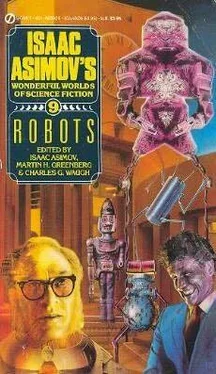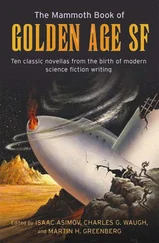Frederik Pohl - Isaac Asimov's Worlds of Science Fiction. Book 9 - Robots
Здесь есть возможность читать онлайн «Frederik Pohl - Isaac Asimov's Worlds of Science Fiction. Book 9 - Robots» весь текст электронной книги совершенно бесплатно (целиком полную версию без сокращений). В некоторых случаях можно слушать аудио, скачать через торрент в формате fb2 и присутствует краткое содержание. Год выпуска: 1989, ISBN: 1989, Издательство: Robinson Publishing, Жанр: Фантастика и фэнтези, на английском языке. Описание произведения, (предисловие) а так же отзывы посетителей доступны на портале библиотеки ЛибКат.
- Название:Isaac Asimov's Worlds of Science Fiction. Book 9: Robots
- Автор:
- Издательство:Robinson Publishing
- Жанр:
- Год:1989
- ISBN:ISBN: 1-85487-041-6
- Рейтинг книги:4 / 5. Голосов: 1
-
Избранное:Добавить в избранное
- Отзывы:
-
Ваша оценка:
- 80
- 1
- 2
- 3
- 4
- 5
Isaac Asimov's Worlds of Science Fiction. Book 9: Robots: краткое содержание, описание и аннотация
Предлагаем к чтению аннотацию, описание, краткое содержание или предисловие (зависит от того, что написал сам автор книги «Isaac Asimov's Worlds of Science Fiction. Book 9: Robots»). Если вы не нашли необходимую информацию о книге — напишите в комментариях, мы постараемся отыскать её.
Isaac Asimov's Worlds of Science Fiction. Book 9: Robots — читать онлайн бесплатно полную книгу (весь текст) целиком
Ниже представлен текст книги, разбитый по страницам. Система сохранения места последней прочитанной страницы, позволяет с удобством читать онлайн бесплатно книгу «Isaac Asimov's Worlds of Science Fiction. Book 9: Robots», без необходимости каждый раз заново искать на чём Вы остановились. Поставьте закладку, и сможете в любой момент перейти на страницу, на которой закончили чтение.
Интервал:
Закладка:
Both Mac and Fitz are not overly impressed by my sudden fame. But I believe Mac is secretly excited by my promise to build him a better body. He has become acutely aware of his appearance; I have caught him gazing (with what emotion, I cannot say) into the mirrors of the house, standing before them with a stillness that only a robot can maintain. I have questioned him at length about his feelings, but have learned little. I must be sure to keep close to his emotional growth.
But if I have a real source of happiness now, it is my son Fitz. He has become a fine handsome boy, of such good humor and intelligence that he is extremely popular with all the residents of the town-and the power of his engaging personality has created an acceptance for Mac, his robot brother, that all my elaborate scientific titles couldn't have attained. He is still fiercely loyal to Mac, but I already detect signs of independence. These do not worry me; they would be natural even among human brothers. Fitz is discovering that he is an individual; it's a process of life.
But I wonder-will Mac feel the same way?
Jan. 4, 2012. There has been a quarrel, and it has taken me several days to learn the true details. I have never been disturbed about quarrels between Fitz and Mac; they have had surprisingly few for brothers. But for the first time, I sensed that the quarrel concerned the differences between them.
It began last week, when a boy of their age, Philip, a hostile surly youth, involved Fitz in a fight.
Philip is the son of a divorced woman in the town, named Mrs. Stanton. She is a strange, brooding woman, with a terrible resentment against her ex-husband. I am afraid some of the resentment has been passed on to her son, Philip, and that he is an unhappy youngster. For the last two months, Fitz has been a frequent visitor to their home, and Mrs. Stanton has displayed great fondness for him. Philip, of course, doesn't like this affection, this stolen love, and has developed a strong animosity towards Fitz. One day, it turned into violence.
Philip is big for his fifteen years, a tall boy, well over six feet, and well muscled. When he stopped Fitz and Mac on the street that morning, it was immediately apparent that he was seeking trouble. Fitz is not afraid of him, I know that; but Fitz tries to laugh trouble away. But the boy was in no mood to be put off with a smile. He lashed out and knocked Fitz down. When he got to his feet, Philip knocked him down again, and then leaped atop him.
I don't know what outcome the fight would have had if Fitz had been allowed to finish it. But he didn't have the chance. Mac, who was standing by, watching the altercation in his blank manner, suddenly threw himself upon his brother's assailant and pulled him away as easily as if Philip had been an infant. He lifted him into the air with his superhuman strength and merely held him there. He didn't hurt Philip, he traded no blows; he simply held him, helpless, in the air, while the boy kicked and screamed his frustration and anger. Fitz shouted at his brother to release him, and eventually Mac did. Philip didn't resume the attack; he was frightened by the easy, unconquerable strength in Mac's metal arms. He turned and ran, shouting threats and ugly names over his shoulder.
Of course, I know Mac's intent was good. He was protecting his brother, and wasn't violating the code of conduct. But I can also understand Fitz's emotion. He didn't feel grateful for Mac's help, only resentful. He turned upon the robot and reviled him, called him terrible names I never knew were in his vocabulary. He told Mac that he didn't want protection, that he could fight his own battles, that he didn't require Mac's metal strength to keep him from harm. He said a great deal more, and it is well that Mac is not more sensitive than he is.
There is a strain between them now. For the last few days, Fitz has been leaving the house without Mac's company. Mac, fortunately, doesn't seem injured by his behavior. He sits, blank-faced as ever, in his room. He reads or listens to his phonograph. Sometimes, he gets up and stares into the mirror, for interminable periods.
Oct. 15, 2016. It is extraordinary, the speed with which Mac has learned his lessons. For the past year, I have been teaching him the secrets of his own construction, and how he himself could repair or improve all or part of his artificial body. He has been spending five or six hours each day in my laboratory workshop, and now I believe he is as skilled as-or perhaps more skilled than-I am myself. It will not be long before he blueprints and builds his own new body. No, not blueprint. I cannot allow him to design the plans, not yet. The Face episode proved that.
It began last Friday evening, when Fitz left the house to take Karen to the movies. As usual, Mac seemed lost without his brother, and sat quietly in his room. About midnight, he must have heard the sound of my typewriter in the study, because he came to the doorway. I invited him in and we chatted. He was curious about certain things, and asking a great number of questions about Karen. Not sex questions, particularly; Mac is as well read as any adult, and knows a good deal about human biology and human passions (I wonder sometimes what his opinion is of it all!) But he was interested in learning more about Fitz and Karen, about the nature of their relationship, the special kind of fondness Fitz seemed to display towards the girl.
I don't believe I was helpful in my answers. Half an hour later, the front door opened and Fitz entered, bearing Karen on his arm.
Karen is a lovely young girl, with an enchanting smile and delightful face. And, if I am not mistaken, very fond of Fitz. She greeted me warmly, but I think she was surprised to see Mac; ordinarily, he kept to his room on Fitz's date nights. Mac responded to her greeting with a muffled noise in his sound system, and retreated upstairs.
I didn't see Mac the next morning, or even the next afternoon. He seemed to have spent the entire day in the workshop. We were at dinner when Fitz and I saw him first, and when we did, we gasped in surprise.
Something had happened to Mac's face, and I knew it was the result of his efforts in the workshop. Instead of the smooth, sculptured mask I had created for him, there was a crudely shaped human face looking at us, a mockery of a human face, with a badly carved nose and cheeks and lips, tinged grotesquely with the colors of the human complexion.
Our first reaction was shock, and then, explosively, laughter. When we were calm again, Mac asked us for an explanation of our outburst, and I told him, as gently as possible, that his attempts to humanize himself were far from successful. He went to a mirror and stared for a long while; then he turned without a word and went back to the laboratory. When we saw him again the next morning, he was the old Mac again. I admit I was relieved.
Oct. 9, 2020. How lost Mac seems without Fitz! Since his brother's marriage last month, he stalks about the house, lumbering like the robot child of old, clanking as if he still possessed the clumsy metal body of his infancy and adolescence. I have been trying to keep him busy in the laboratory, but I think he knows that I am indulging him rather than truly using his abilities. Not that I don't value his skill. At his young age, my robot son is as skilled a robotics engineer as any man in the country. If only the nation's robotics companies would recognize that, and overlook the fact that his ability stems from a nonhuman brain!
I have now written or personally contacted some seventeen major engineering concerns, and each of them, while polite, has turned down my suggestion. This morning, a letter arrived from the Alpha Robotics Corporation that typifies their answers. We are certain that your description of the applicant's engineering abilities is accurate. However, our company has certain personnel standards which must be met. We will keep the application on file…
Читать дальшеИнтервал:
Закладка:
Похожие книги на «Isaac Asimov's Worlds of Science Fiction. Book 9: Robots»
Представляем Вашему вниманию похожие книги на «Isaac Asimov's Worlds of Science Fiction. Book 9: Robots» списком для выбора. Мы отобрали схожую по названию и смыслу литературу в надежде предоставить читателям больше вариантов отыскать новые, интересные, ещё непрочитанные произведения.
Обсуждение, отзывы о книге «Isaac Asimov's Worlds of Science Fiction. Book 9: Robots» и просто собственные мнения читателей. Оставьте ваши комментарии, напишите, что Вы думаете о произведении, его смысле или главных героях. Укажите что конкретно понравилось, а что нет, и почему Вы так считаете.









